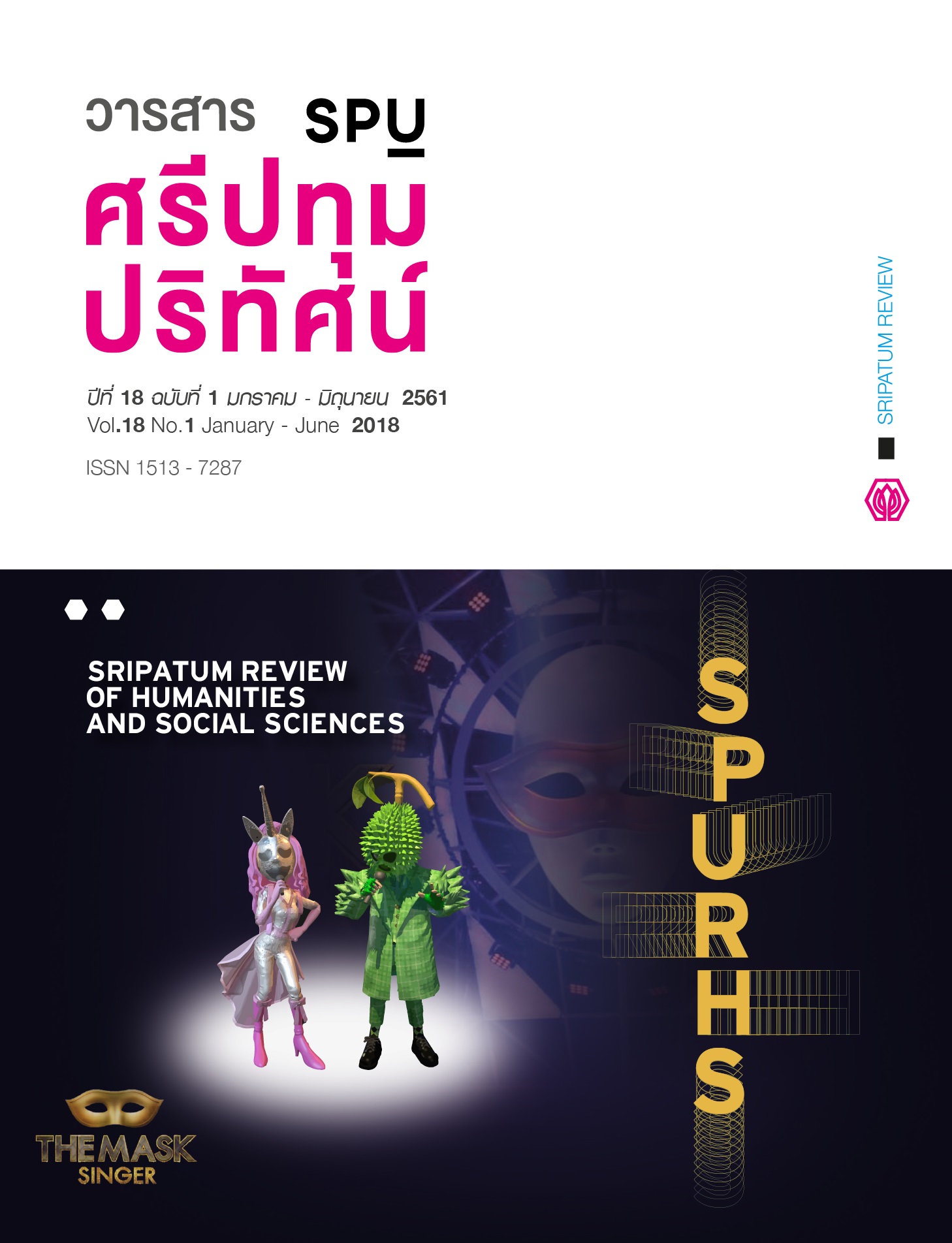DISCRIMINANT ANALYSIS OF CORPORATE SOCIAL ENTREPRENEURSHIP CHARACTERISTICS AFFECTING CORPORATE ECONOMIC SUSTAINABILITY IN THE STOCK EXCHANGE OF THAILAND
Main Article Content
Abstract
The objectives of this research were to identify and explain important factors of corporate social entrepreneurship which can discriminate the economic sustainable companies in the Stock Exchange of Thailand. This study collected the secondary data from SETSMART database and stock market website. The averages of annual data of 402 listed companies of Stock Exchange of Thailand (SET) during period 2012 to 2014 were used for analysis. Descriptive statistics and discriminant analysis have been employed. The equation of this research was D = β0+β1COLL + β2LETTER + β3PROMO + β4REPORT + β5STAKE + β6DIV + β7OPP + β8MISSION + β9ACT + β10CGR + β11IND + β12DUAL. The new 12 quantitative variables for corporate social entrepreneurship factor of this study were developed. The results showed that (1) the averages of the percentage of Independent Directors in the Board (IND) and separation of the Chairman of the Board from the Managing Director (DUAL) were not different between the companies with sustainable and unsustainable economic conditions, but other independent variables were significantly different; (2) the standardized discriminant function of this study was Z’ = 0.519ZSTAKE + 0.643ZDIV + 0.364ZCGR. From the coefficients of independent variables, it was found that the best discriminant variable was dividend yield (DIV), followed by numbers of information channel for stakeholders (STAKE) and corporate governance rating (CGR) respectively; and (3) the equation derived from the research can correctly classify the original grouped cases by 69.2 percent, based on the probability of being accurately predicted.
Article Details
1. กองบรรณาธิการสงวนสิทธิ์ในการพิจารณาและตัดสินการตีพิมพ์บทความในวารสาร
2. บทความทุกเรื่องจะได้รับการตรวจสอบทางวิชาการโดยผู้ทรงคุณวุฒิ แต่ข้อความและเนื้อหาในบทความที่ตีพิมพ์เป็นความรับผิดชอบของผู้เขียนแต่เพียงผู้เดียว มิใช่ความคิดเห็นและความรับผิดชอบของมหาวิทยาลัยศรีปทุม
3. การคัดลอกอ้างอิงต้องดำเนินการตามการปฏิบัติในหมู่นักวิชาการโดยทั่วไป และสอดคล้องกับกฎหมายที่เกี่ยวข้อง
References
ณิชนันท์ จันทรเขตต์. 2554. “การศึกษาความสัมพันธ์ระหว่างการกำกับดูแลกิจการกับผลการดำเนินงานของบริษัทจดทะเบียนในตลาดหลักทรัพย์แห่งประเทศไทย กลุ่ม SET100.” วิทยานิพนธ์ปริญญามหาบัณฑิต สาขาวิชาการบัญชี บัณฑิตวิทยาลัย มหาวิทยาลัยหอการค้าไทย.
อรทิชา อินทาปัจ. 2559. “ปัจจัยที่กำหนดการจ่ายเงินปันผลของบริษัทจดทะเบียนในตลาดหลักทรัพย์ เอ็ม เอ ไอ.” วิทยานิพนธ์ปริญญามหาบัณฑิต สาขาวิชาการเงิน บัณฑิตวิทยาลัย มหาวิทยาลัยกรุงเทพ.
Anosike, C. 2014. “Sustainability efforts of one oil company in Niger Delta of Nigeria.” Doctoral dissertation, Walden University, USA.
Aggarwal, P. 2013. Sustainability reporting and its impact on corporate financial performance: A literature review. Indian Journal of Commerce & Management Studies, 4(3), 51-59.
Brace, N., Kemp, R. & Snelgar, R. 2012. SPSS for Psychologists. 5th edition. UK: Palgrave MacMillan.
Broberg, M., and Lindh, K. 2012. “Dividend-yield, an indicator for successful trading? – A study of dividend-yield’s impact on total stock return on the Swedish stock market.” Retrieved October 17, 2017.
Crisan, C.M., & Borza, A. 2012. “Social entrepreneurship and corporate social responsibilities.” International Business Research, 5(2), 106-113.
Dave, P., Wadhwa, V., Aggarwai, S., & Seetharaman, A. 2013. “The impact of research and development on the financial sustainability of information technology (IT) companies listed on the S&P500 index.” Journal of Sustainability Development, 6(11), 123-138.
Delai, I., & Takahashi, S. 2011. “Sustainability measurement system: A reference model proposal.” Social Responsibility Journal, 7(3), 438-471.
Ergin, E. 2012. “Corporate governance ratings and market-based financial performance: Evidence from Turkey. “ International Journal of Economics and Finance, 4(9), 61-68.
Gandy, J.D. 2012. “The relationship between social entrepreneurship and organizational effectiveness.” Doctoral dissertation. Dallas Baptist University, USA.
Haat, M.H.C., Rahman, R.A., & Mahenthiran, S. 2008. “Corporate governance, transparency and performance of Malaysian companies.” Managerial Auditing Journal, 23(8), 744-778.
Hair, J.F., Black, W.C., Babin, B.J., & Anderson, R.E. 2014. Multivariate data analysis. 7th edition. US: Pearson Education Limited.
Jackson, C.A. 2014. “Corporate social responsibility training: Exploring the antecedents to corporate social entrepreneurship.” Doctoral dissertation, Kansas State University, USA.
Jiao, H. 2011. “A conceptual model for social entrepreneurship directed toward social impact on society.” Social Enterprise Journal, 7(2), 130-149.
Lipunga, A.M. 2014. “Corporate governance practices in commercial banking sector of Malawi: Evidence from annual reports.” Journal of Applied Finance & Banking, 4(5), 115-133.
Michelon, G. 2011. “Sustainability disclosure and reputation: A comparative study.” Corporate Reputation Review, 14(2), 79-96.
Miles, J.A. 2012. Management and Organization Theory: A Jossey-Bass reader. San Francisco: John Wiley & Sons.
Movassaghi, H. & Bramhandkar, A. 2012. “Sustainability strategies of leading global firms and their financial performance: A comparative case based analysis.” Journal of Applied Business and Economics, 13(5), 21-34.
Pandey, C.L. 2014. “The limits of climate change agreements: From past to present.” International Journal of Climate Change Strategies and Management, 6(4), 376-390.
Rahman, M.A. & Mazlan, A.R. 2014. “Determinants of financial sustainability of microfinance institutions in Bangladesh.” International Journal of Economics and Finance, 6(9), 107-116.
Saul, P. 2011. Social innovation Inc.: 5 strategies for driving business growth through social change. USA: HB Printing.
Savitz, A.W. 2013. Talent, transformation, and the triple bottom line: How companies can leverage human resources to achieve sustainable growth. San Francisco: Jossey-Bass.
Siew, R.Y.J., Balatbat, M.C.A., & Carmichael, D.G. 2013. “The relationship between sustainability practices and financial performance of construction companies.” Smart and Sustainable Built Environment, 2(1), 6-27.
Siminica, M., Craciun, L., & Dinu, A. 2015. “The impact of corporate sustainability strategies on the financial performance of Romanian companies in the context of green marketing.” Amfiteatru Economic, 17(40), 994-1010.
Stanley, S. 2012. “The Evolution of Sustainability: A Public Relations and Business Argument.” Master’s Thesis, University of Southern California, USA.
Szekely, F. & Strebel, H. 2013. “Incremental, radical and game-changing: Strategic innovation for sustainability.” Corporate Governance, 13(5), 467-481.
Yang, C. 2011. “The Role of IS-enabled Capability in Corporate Sustainability: Evidence from China.” Doctoral dissertation, Hong Kong Baptist University, China.
Zolfaghari, L. 2015. “The impact of dynamic capabilities on sustainability performance in the biotechnology industry.” Doctoral dissertation, Alliant International University, USA.


